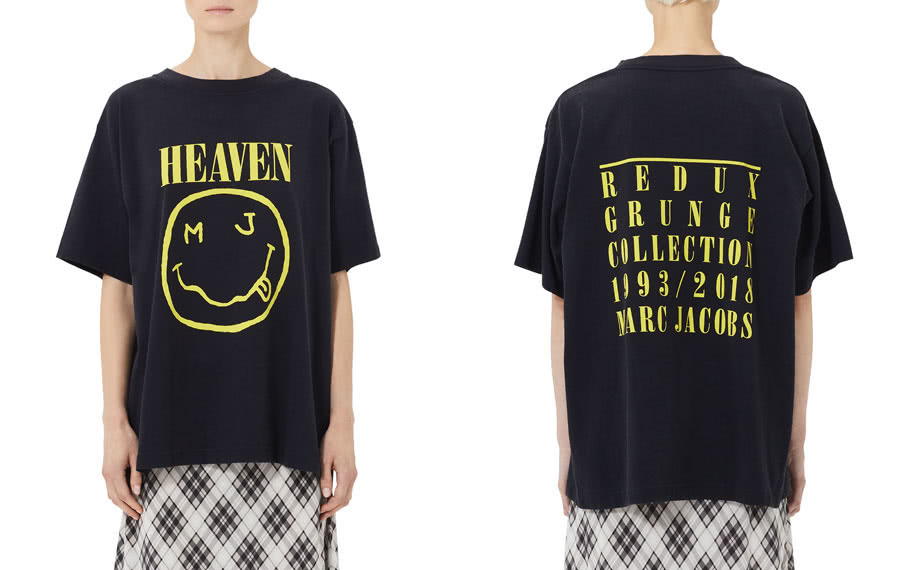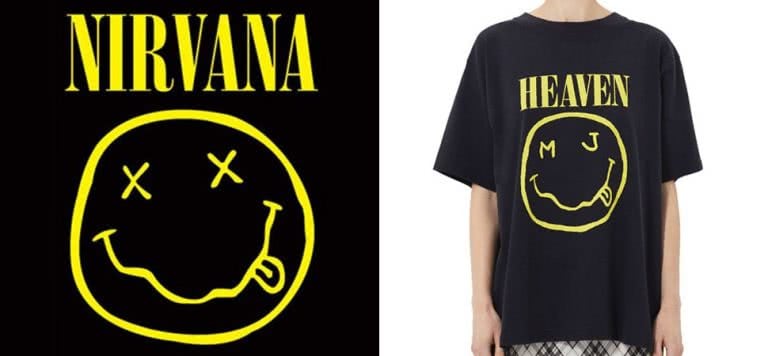Fashion label Marc Jacobs has hit back at claims they ripped off the iconic Nirvana logo, requesting a lawsuit to that effect be dismissed.
Late in 2018, the music world was somewhat surprised to learn of a new item by the Marc Jacobs fashion label. Part of their ‘Bootleg Redux Grunge’ collection, the recently-released shirt featured a seemingly-reworked image of Nirvana’s classic logo.
The band’s logo, which first appeared in September of 1991, is famed for its simple design. Featuring an almost intoxicated-looking smiley face, the logo is paired with the bold iconography of the band’s name.
Shirts released by the group also featured the words “Flower Sniffin, Kitty Pettin, Baby Kissin, Corporate Rock Whores” plastered onto the rear.
However, instead of ‘Nirvana’, the now-unavailable shirt released by Marc Jacobs says ‘Heaven’, and in place of the smiley-face’s eyes are the initials MJ. Likewise, the rear text has been altered to read “Redux Grunge Collection 1993/2018 Marc Jacobs”.
Needless to say, it appeared to be a rather simple case of the fashion label ripping off the group, with Nirvana’s surviving members filing a lawsuit to that effect.
Now, Marc Jacobs has issued a statement denying that he ripped off the group’s logo, even claiming that he popularised the now-iconic grunge style.
Love Music?
Get your daily dose of metal, rock, indie, pop, and everything else in between.

As The Blast reports, court documents were filed on Friday, March 8th, which saw Marc Jacobs’ lawyers requesting a motion for dismissal.
In the documents, Jacobs offered up some historical fashion facts, noting that his 1993 fashion line helped bring the grunge look to the mainstream.
“The collection was considered groundbreaking in the fashion world, because it brought together high fashion and streetwear on the runway in a way that had never been done before,” the documents note. “The debut of the SS93 Grunge Collection is now considered to be one of the most influential runway fashion shows of the 1990s.”
Likewise, Jacobs explains that Courtney Love, the widow of Kurt Cobain, was a highly influential in the creation of the line. In fact, photos from the fashion line’s launch even show model Kristen McMenamy dressed in a Nirvana shirt.
“In 1994 Marc Jacobs met Courtney Love and Frances Bean Cobain (then two years old), the daughter of Ms. Love and the then-late Mr. Cobain, beginning a personal and professional relationship with both women that endures to this day.”
As Pitchfork adds, the same court documents issued by Marc Jacobs’ lawyers claim that Nirvana L.L.C. does not own the copyright of the band’s logo, thereby making claims of ripping it off invalid.
According to the documents filed, Marc Jacobs’ lawyers argue that while Kurt Cobain had been the copyright holder of the original logo’s design, it is not clear when or if ownership of the copyright was transferred to Nirvana, L.L.C.
Likewise, while Nirvana’s initial suit claimed that Marc Jacobs’ “use of copyrighted image on and to promote its product is intentional, and is part and parcel of a wider campaign associate the entire ‘Bootleg Redux Grunge’ collection with Nirvana,” Marc Jacobs’ lawyers claim that “there is no extrinsic similarity” between the two designs.
Yes, despite the two designs looking almost identical, Marc Jacobs’ legal team claim that because the image doesn’t use the word ‘Nirvana’, x’s for the eyes, or an exact copy of the text on the rear of the shirt, it is therefore a completely different design.
In their words, “The only similarity between what is covered by the ’166 Registration and the artwork contained on the Accused Products that can be gleaned from the Complaint is the use of a substantially circular outline for the smiley face and a squiggly line used for a mouth, with a tongue sticking out.”
Needless to say, it’s going to be interesting to see how this one plays out in court.
Check out Nirvana’s ‘Smells Like Teen Spirit’:


































